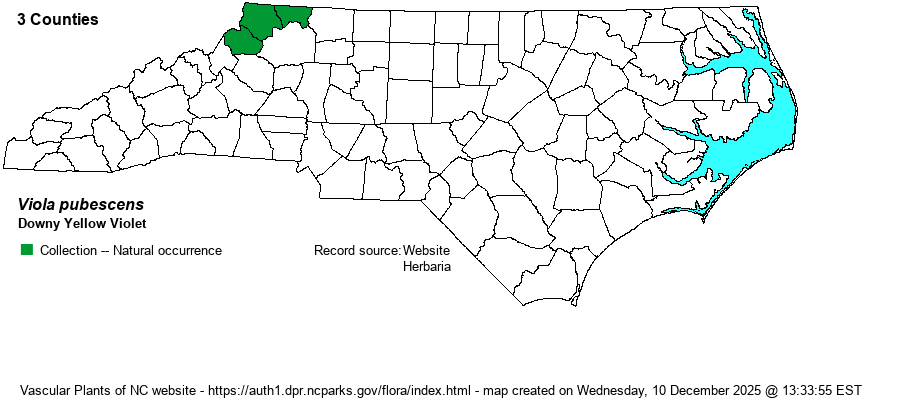| Author | Aiton | |
| Distribution | The identity and taxonomy of Viola pubescens and V. eriocarpa, which have each gone by several names depending on the authority/reference, was formerly muddled. Now, however, the current names used by this website are believed to be accurate. Sorrie annotated all NCU specimens in 2011 and considers V. pubescens to be the more geographically restricted of the two in NC and is limited to the Mountains. The range map below shows the confirmed records at NCU as annotated by Harvey Ballard in July 2024 and Sorrie at SERNEC in September 2024; but it may be found elsewhere in the Mountains. The Alleghany specimen was collected in 2010, the Ashe specimens in 1971 and 1958, the Watauga specimen in 2000. Note that V. eriocarpa is also found throughout the Mountains as well, and in many or most Piedmont and upper Coastal Plain counties. Specimens from Clay County (Chunky Gal Mountain) and elsewhere show pubescence on upper portion of petioles and underside of leaves; otherwise they match V. eriocarpa.
This is an Eastern species, ranging from ME to SD, and south to DE, NC, and TN -- southward mainly just in the Appalachians. | |
| Abundance | Probably uncommon or rare in the Mountains, but considerable past confusion with V. eriocarpa has perhaps meant that pubescens has been somewhat overlooked. Absent downstate. The website editors suggest a State Rank of S3?. | |
| Habitat | These two species grow in rich hardwood forests, typically in circumneutral soil. Habitats can be on slopes or in rich bottomlands. V. pubescens in NC seems limited to forested slopes, in rich soil (such as in Rich Cove Forests). | |
| Phenology | Blooms from March to May, and fruits soon after flowering. | |
| Identification | This species and V. eriocarpa must be treated together for general identification. Each has leaves emerging from the flowering stem, heart-shaped with a cordate base, and bright yellow flowers. Weakley (2018) separates the two in his key: V. pubescens -- "Stems 1 (-2), erect in flower; basal leaves 0 (-2); foliage densely pubescent throughout, leaf blades gray-green (paler abaxially); cauline leaves clustered in the uppermost 1/4 of the stem, broadly ovate to reniform, subcordate to broadly cuneate at base, broadly obtuse to rounded at apex; [montane in our region]". V. eriocarpa -- "Stems mostly 2 to several, commonly decumbent proximally or ascending in flower; basal leaves (1) 2 (-5); foliage glabrous or thinly pubescent on upper stem and petioles; leaf blades medium green (paler abaxially); cauline leaves distributed over much of the stem length, ovate, cordate at base, acute to abruptly short-acuminate at apex; [widespread in our region]". This is the more erect species, with stem leaves mostly "whorled" near the top of the stem, and with hairy leaves that are gray-green in color. | |
| Taxonomic Comments | Very confusing, and much too confusing to describe here. Many or most references treat these two entities as one species. NatureServe considers this taxon as V. pubescens var. pubescens, and considers V. eriocarpa as V. pubescens var. scabriuscula.
General note on Viola: In 2009-10 B.A. Sorrie (website map editor) went through the whole collection at NCU, annotating all specimens against those verified by experts in the genus. The range maps in RAB (1968) have been changed accordingly. More recently, Harvey Ballard and colleagues are in the process of revising all Eastern and Southeastern Viola, and have annotated all specimens at NCU in July 2024. They recognize additional species not in RAB or in previous editions of Weakley et al.; we will follow updated editions of Weakley et al. in recognizing them. Species range maps have been adjusted to account for identification changes. | |
| Other Common Name(s) | None | |
| State Rank | S4 [S3?] | |
| Global Rank | G5 | |
| State Status | | |
| US Status | | |
| USACE-agcp | FACU link |
| USACE-emp | FACU link |

